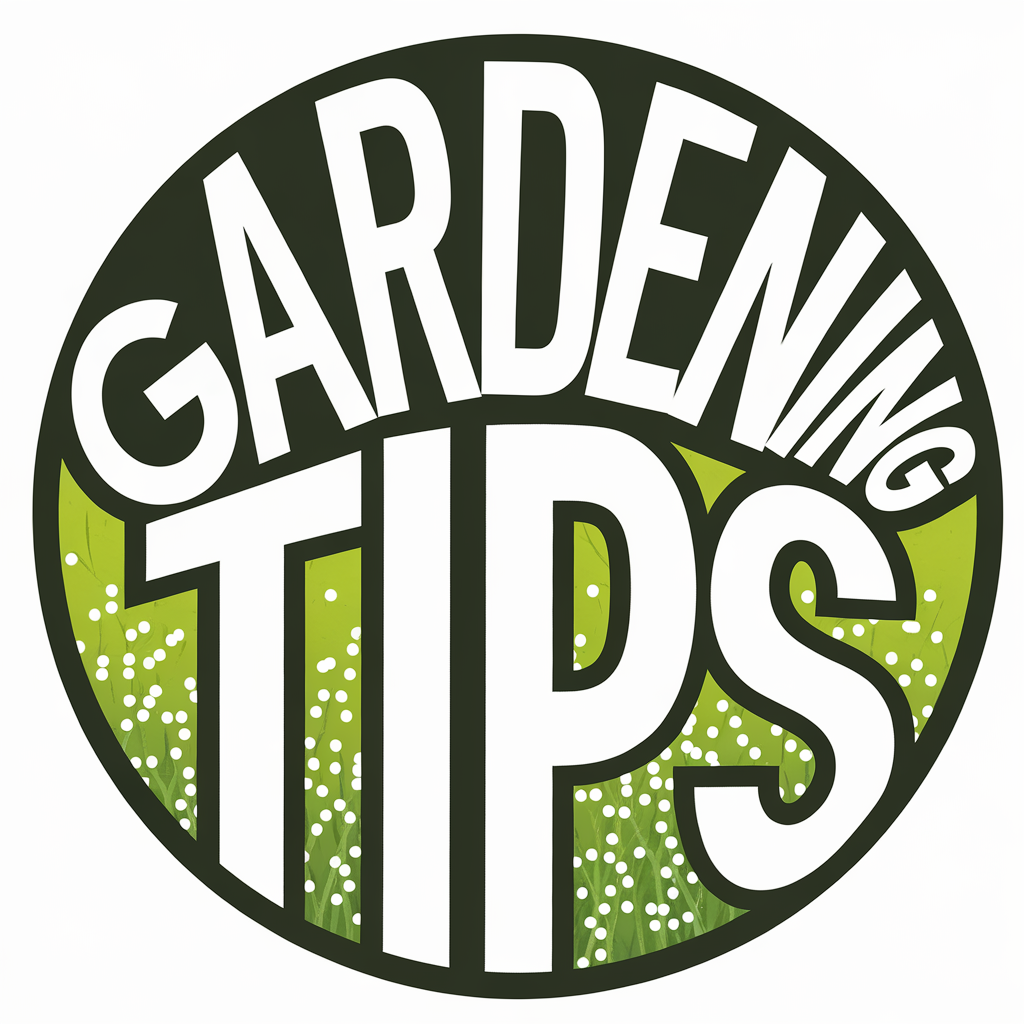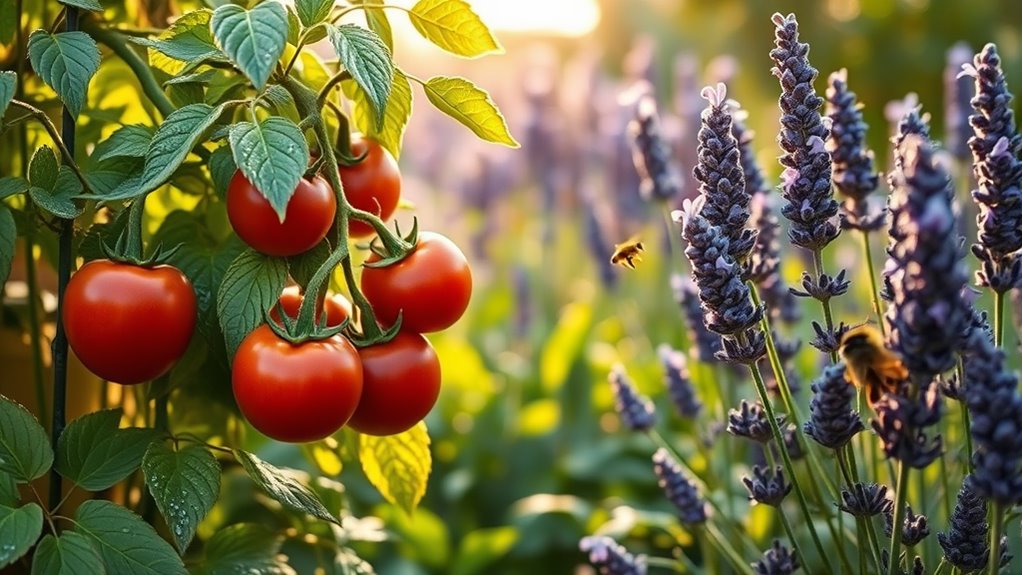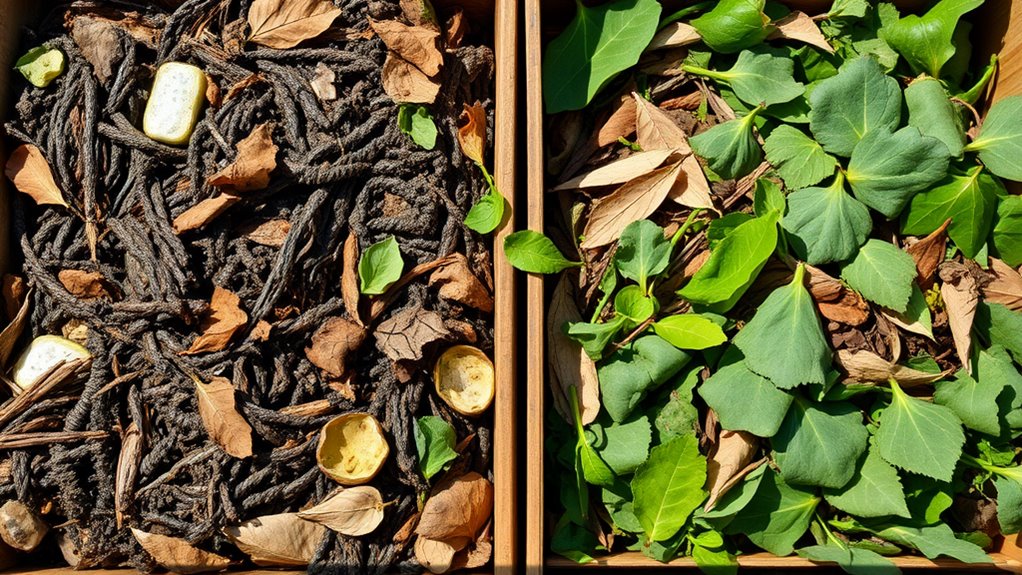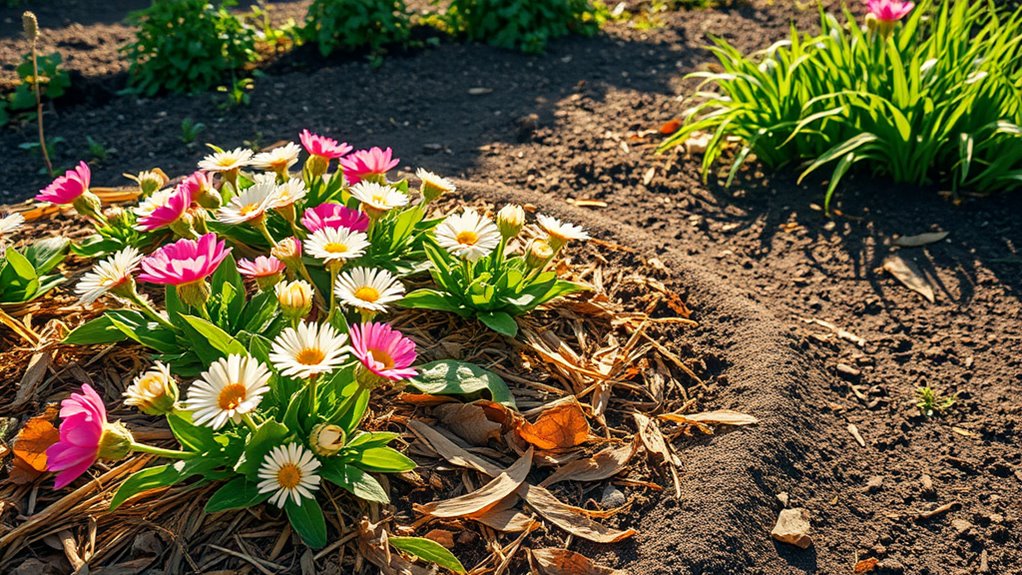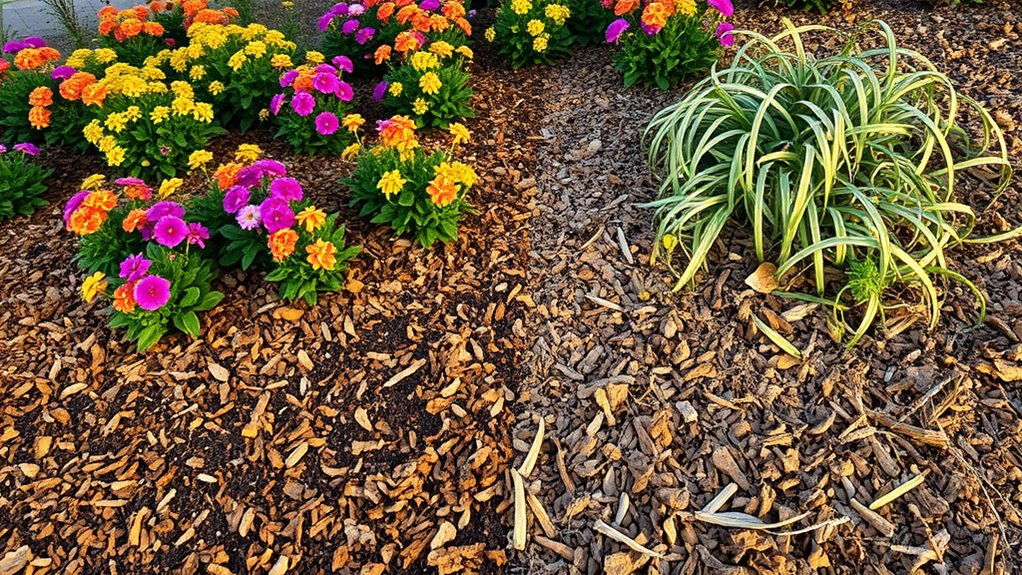I Ditched Chemicals and My Garden Has Never Looked Better
If you’ve ditched chemicals, you’ll find your garden thriving with natural methods like neem oil, which disrupts pest life cycles without harming beneficial insects. Composting enriches soil with essential nutrients, while crop rotation prevents diseases and boosts fertility. It’s a practical, science-backed way to promote healthier plants and a balanced ecosystem. Explore these techniques further to elevate your garden’s success.
Key Takeaways
- Switching to organic gardening promotes ecological balance and healthier plants, enhancing overall garden aesthetics.
- Neem oil serves as a natural alternative to chemicals, disrupting pest life cycles without harming beneficial insects.
- Composting kitchen scraps and yard waste creates nutrient-rich soil, supporting robust plant growth and vitality.
- Natural methods boost soil nutrients, improving fertility and enabling plants to thrive in various weather conditions.
- Introducing beneficial insects like ladybugs naturally controls pests, reducing populations and fostering a sustainable garden ecosystem.
Why I Switched to Organic Gardening
After years of relying on chemical pesticides, I’ve switched to organic gardening because it’s safer for my health and the environment. This change also promotes ecological balance by enhancing microbial activity and nutrient cycling in the soil. As shared in my blog, this change has brought about a remarkable positive transformation in my garden.
Exploring Natural Alternatives to Chemicals
As you transition to organic gardening, consider these five natural alternatives to chemical pesticides, which actively enhance plant health while minimizing environmental harm. Embracing these approaches supports a thriving garden ecosystem by utilizing easily accessible staples for pest prevention.
First, neem oil disrupts insect life cycles without harming beneficial bugs.
Second, insecticidal soaps break down pests’ protective coatings for quick control.
Third, diatomaceous earth pierces insect exoskeletons, offering a physical barrier.
Fourth, introduce ladybugs; they devour aphids and mites naturally.
Fifth, garlic or chili sprays repel invaders through strong odors and compounds.
You’ll apply these scientifically, monitoring efficacy and adjusting doses to foster a balanced ecosystem.
In addition, incorporating natural herbs can provide further effective solutions for deterring pests in gardens and homes.
My Initial Steps in Chemical-Free Practices
First, evaluate your garden’s current state to pinpoint pest pressures and soil conditions.
You’ll observe plant health indicators, such as leaf discoloration or stunted growth, to identify imbalances. Test soil pH and nutrient levels using affordable kits, noting deficiencies that affect vitality. Furthermore, soil testing plays a key role in unlocking garden success by helping to identify and remedy potential soil issues.
Document daily observations in a journal, tracking weather patterns and pest activity for patterns. This baseline data empowers you to make informed decisions, fostering a resilient ecosystem without chemicals.
By decoding soil signs, you can better interpret indicators of soil health and fertility for improved garden management.
Essential Organic Methods for Garden Care
While chemical-free gardening demands proactive steps, you can enhance your garden’s health by adopting essential organic methods like composting and natural pest control.
Start composting by mixing kitchen scraps, yard waste, and soil to create nutrient-rich humus that boosts soil fertility and microbial activity. To optimize your compost, incorporate kitchen scraps such as fruit and vegetable peels to recycle waste and improve soil health.
For natural pest control, introduce beneficial insects such as ladybugs to prey on aphids, or apply diluted neem oil, which disrupts pest life cycles without harming pollinators.
Regularly rotate crops to prevent soil depletion and disease buildup, ensuring a balanced ecosystem.
Monitor your garden weekly to adjust these practices, promoting sustainable growth.
To further enhance your pest management, explore unconventional remedies that include effective natural options for reclaiming your space from pests.
How Plants Flourished Without Synthetic Aids
Plants flourish without synthetic aids by leveraging natural soil ecosystems and biological interactions. Additionally, incorporating homemade alternatives like kitchen scraps into your compost can further boost nutrient availability and reduce waste.
You enhance this process by adding compost, which introduces microbes that decompose organic matter and release essential nutrients directly to your plant roots.
Actively, you’re promoting symbiotic fungi that extend root networks, improving water absorption and nutrient uptake in a balanced manner.
Scientifically, this relies on soil biodiversity where bacteria fix nitrogen and earthworms aerate the ground, fostering resilience.
Practically, you maintain it through regular mulching and crop rotation, ensuring long-term soil health without artificial inputs.
By implementing year-round strategies, you can sustain your garden’s health across all seasons with organic techniques and sustainable practices.
Key Benefits of Going All-Natural
You’ll notice healthier plant growth in your garden when you choose all-natural methods, as they support robust, chemical-free development.
This approach delivers eco-friendly results by minimizing your impact on local ecosystems and wildlife.
It also boosts soil nutrients, enhancing long-term fertility for sustainable gardening.
Moreover, these methods enable your garden to thrive in heat during challenging weather like heatwaves.
Additionally, by incorporating organic gardening tips, you can effectively enhance plant growth and health for a thriving garden.
Healthier Plant Growth
When you adopt chemical-free gardening, it enhances your plants’ growth by fostering robust root systems and natural pest resistance. This method boosts overall vitality through soil biology, where beneficial microbes break down nutrients efficiently.
-
Strengthens root development: You encourage deeper roots by using organic amendments, improving water uptake and stability.
-
Enhances nutrient efficiency: Plants absorb minerals more effectively without synthetic interference, leading to denser foliage.
-
Builds natural defenses: Your garden promotes plant immunity via diverse ecosystems, reducing disease susceptibility.
Eco-Friendly Results
Beyond healthier plant growth, chemical-free gardening delivers clear environmental gains that sustain ecosystems.
You reduce water pollution by avoiding synthetic chemicals that leach into streams, safeguarding aquatic habitats and species. This approach enhances biodiversity, attracting pollinators and beneficial insects that maintain natural balances in your garden.
You’re also cutting greenhouse gas emissions through lower energy use in organic methods, as they rely on renewable resources.
Plus, it minimizes waste from packaging and production, fostering a sustainable cycle that supports planetary health without harming future generations.
Soil Nutrient Boost
One of the primary advantages of chemical-free gardening is the natural enhancement of soil nutrients.
You’ll notice your soil retains essential elements like nitrogen, phosphorus, and potassium more effectively through organic methods. This boosts overall fertility, fostering a healthier ecosystem for your plants.
Here’s how it benefits you:
-
Promotes microbial diversity****: Beneficial bacteria and fungi break down organic matter, releasing nutrients gradually for sustained plant growth.
-
Improves soil structure****: Organic amendments enhance water retention and aeration, reducing erosion and nutrient loss.
-
Enhances nutrient uptake****: Plants absorb micronutrients more efficiently, leading to stronger roots and higher yields without synthetic additives.
Natural Ways to Manage Garden Pests
You can manage garden pests effectively by introducing beneficial insects like ladybugs to prey on aphids.
Crafting homemade sprays from ingredients such as garlic and soap, and practicing companion planting to deter unwanted bugs are also effective methods.
These techniques harness natural biological processes and plant synergies, reducing pest populations while supporting ecosystem health.
Start incorporating them into your routine to maintain a balanced, chemical-free garden.
Beneficial Insects
Beneficial insects provide an effective, chemical-free strategy for controlling garden pests.
You can invite these natural predators into your garden to maintain a balanced ecosystem, reducing damage from harmful bugs without synthetic interventions.
-
Ladybugs: Release these voracious eaters to consume aphids and mites, protecting your plants actively.
-
Lacewings: Plant nectar-rich flowers to attract them; their larvae devour soft-bodied pests like mealybugs.
-
Parasitic wasps: Encourage these by avoiding broad-spectrum pesticides; they lay eggs in caterpillars, naturally controlling outbreaks.
Homemade Sprays
Homemade sprays emerge as a practical alternative for naturally tackling garden pests, building on insect-based methods with easy-to-prepare solutions. You’ll find these sprays effective and simple, using natural ingredients like garlic or soap to disrupt pest behavior without harming your garden’s ecosystem.
| Spray Type | Key Ingredients | Primary Use |
|---|---|---|
| Garlic Spray | Garlic cloves, water | Repels aphids and mites |
| Soap Spray | Mild liquid soap, water | Kills soft-bodied insects |
| Neem Oil Spray | Neem oil, water | Disrupts insect growth cycles |
| Chili Spray | Chili peppers, water | Deters chewing pests |
| Vinegar Spray | White vinegar, water | Controls fungal pests |
Test sprays on a small area first; it’s a safe, scientific approach for optimal results.
Companion Planting
Companion planting offers a strategic way to manage garden pests naturally, pairing specific plants that repel insects or boost each other’s defenses to foster a balanced ecosystem.
You’ll enhance your garden’s health by strategically combining plants, drawing on scientific principles like allelopathy and predator attraction.
-
Pair marigolds with tomatoes****: Their roots release compounds that deter nematodes, reducing soil-borne pests.
-
Plant basil near peppers****: It emits scents that repel aphids and enhances pepper growth through companion synergy.
-
Interplant garlic among roses: Garlic’s sulfur compounds ward off aphids and mites, promoting a pest-resistant environment.
This approach minimizes chemical use while boosting biodiversity.
Boosting Soil Vitality the Eco-Friendly Way
As you cultivate a thriving garden without chemicals, incorporating eco-friendly techniques like composting and cover cropping can revitalize your soil’s structure and nutrient content.
You enrich your soil by adding compost, which introduces beneficial microbes that break down organic matter, releasing essential nutrients and improving water retention.
Meanwhile, cover crops such as clover or rye protect against erosion, fix atmospheric nitrogen through root symbiosis, and enhance microbial activity when tilled in.
These methods foster a balanced ecosystem, boosting fertility naturally and supporting healthier plant growth in your chemical-free haven.
Cost-Effective Tips for Sustainable Gardening
You can easily compost at home using kitchen scraps and yard waste, turning them into free, nutrient-rich soil amendments that boost your garden’s health.
This method not only reduces waste but also supplies essential microbes that enhance plant growth without chemical inputs.
At the same time, you’ll implement straightforward water-saving techniques, like mulching and drip irrigation, to conserve resources while maintaining a thriving, sustainable setup.
Compost at Home
Creating your own compost at home transforms kitchen scraps and yard waste into nutrient-rich soil, making it a budget-friendly way to boost garden sustainability.
This process enhances soil structure and microbial activity, reducing the need for synthetic fertilizers.
To get started, follow these steps:
-
Balance materials: Layer green waste (like vegetable peels) with brown waste (such as dried leaves) to maintain a 2:1 carbon-to-nitrogen ratio, promoting efficient decomposition.
-
Aerate regularly: Turn the pile weekly using a fork to introduce oxygen, accelerating breakdown and preventing odors from anaerobic bacteria.
-
Monitor conditions: Keep the compost moist but not soggy, aiming for 50-60°C to kill pathogens, then harvest ready compost after 2-3 months for your garden beds.
Save Water Easily
Water conservation plays a key role in sustainable gardening, where simple, cost-effective techniques help reduce usage without sacrificing plant health.
You can start by mulching with organic materials like leaves or straw, which minimizes evaporation and retains soil moisture.
Install a DIY drip irrigation system using recycled bottles to deliver water directly to roots, cutting waste by up to 50%.
Harvest rainwater with a basic barrel setup, providing free water for your plants.
Group species by water needs—pair drought-tolerant varieties like succulents with efficient soakers—to optimize usage.
Monitor soil moisture scientifically with a cheap probe, ensuring you water only when necessary, saving resources and promoting healthier growth.
Long-Term Results of My Organic Journey
As I’ve maintained an organic gardening approach for over a decade, the long-term results have transformed my soil’s health and productivity.
You’ve likely seen how this shift boosts your garden’s resilience, fostering a balanced ecosystem that sustains itself.
Here’s a breakdown of the key benefits:
-
Improved soil structure: Organic matter builds microbial activity, enhancing water retention and nutrient cycling for better root growth.
-
Biodiversity boost: Natural practices attract pollinators and beneficial insects, reducing pests and promoting plant health through ecological balance.
-
Sustained yields: Over time, you achieve consistent harvests with minimal inputs, as plants adapt to a chemical-free environment.
Embrace these changes for a thriving garden.
